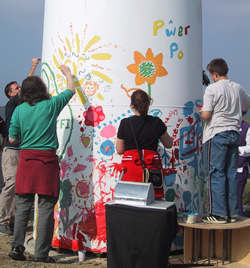 One of the most effective ways to make a lot of renewable energy with just a little patch of land is to use a large wind turbine. Solar too is always better when there is a lot of it. However large scale wind and solar don’t come cheap. One way around the high cost of these projects would be to get together with a bunch of your friends and neighbors and pool your resources.
One of the most effective ways to make a lot of renewable energy with just a little patch of land is to use a large wind turbine. Solar too is always better when there is a lot of it. However large scale wind and solar don’t come cheap. One way around the high cost of these projects would be to get together with a bunch of your friends and neighbors and pool your resources.
This would allow you to buy a very large wind turbine, or set up a field of solar for your neighborhood, use the energy from it and sell the rest. The offset of not having an electric bill combined with the revenue sharing would be used to pay back your part of the investment. You would in essence be your own little neighborhood power company.
There is only one problem…
In a lot of places doing this can be very hard (pdf), or even outside the local legal framework.
There is hope however. Communities have been finding ways to get their renewable energy cake and eat it too. Towns like Hull Ma, decided that they needed a way to power the town that was clean and renewable. The community came together and with the help of the local municipal energy district has erected not one but two wind turbines.
In late 1998 a new group of citizens eager to see the project go forward formed themselves into C.A.R.E. (Citizens for Alternative Renewable Energy), selected officers Malcolm Brown and Andrew Stern, and went to Hull Light to urge them to take the project on.
The plan was to work in collaboration with UMass Amherst’s Renewable Energy Research Laboratory, and its director, Professor James Manwell. Prof. Manwell, along with his colleagues consults regularly for the Mass. Department of Energy Resources on windpower and other renewable’s.
By fall of 1999 Manwell’s team, with substantial assistance from the state DOER, completed a full engineering report. This included wind-resource assessments, discussions of regulatory issues, noise-level tabulations, projected economic viability under various brands, presentation of computer-generated photo simulations of various possible sites.
They had such a good time with the first one that they went and installed a second one several years later, this time at the old town dump. The town now gets over 20% of its energy from wind.
Hull is not alone, the tiny province of Prince Edward Island in Canada has also taken steps to make renewable energy as beneficial as possible to its residents.
So what if you want to help your community gain a large scale shared renewable energy project? There are now several organizations that have been formed to help do just that. One such group is Northwest Community Energy. Their mission is to help communities in the American north west region start, finance, and run their own large scale shared community renewable energy project.
Renewable energy and energy efficiency investments carry remarkable benefits including lower environmental impact, greater price stability, and greater energy security, when compared to investments in fossil fuel generation. In addition to those substantial benefits common to all clean energy solutions, Community Energy has several distinct advantages including:
- Greater economic benefit to local communities
- Increased local awareness and involvement in clean energy
- Communities are strengthened through their collaborative efforts
These are the driving forces behind most community based efforts, and the reason we decided to create this website.
In fact there seem to be a plethora of community based renewable energy resource sites on the net, all ready to help your community start its next big green project.
Very good. Kinda reminds me of the “victory garden” concept during WWII.
It’s no so much a solution as the the benefit of increased awareness which results in increased conservation and decreased resistance to larger projects.
Awesome resource links as well.
Very, very, well done.
Northwest Community Energy is not actually a group, it is a website http://www.nwcommunityenergy.org, put together by the non-profit organization, Northwest SEED – Sustainable Energy for Economic Development.